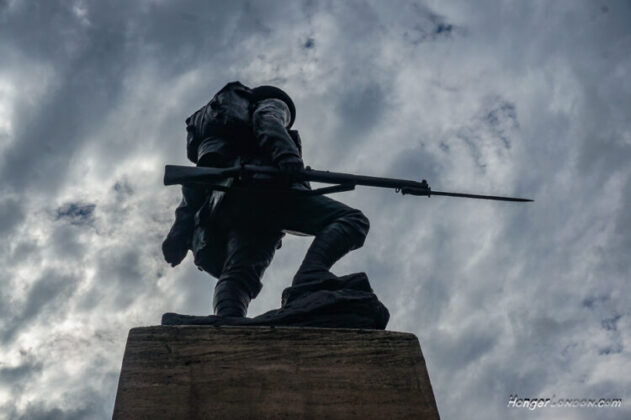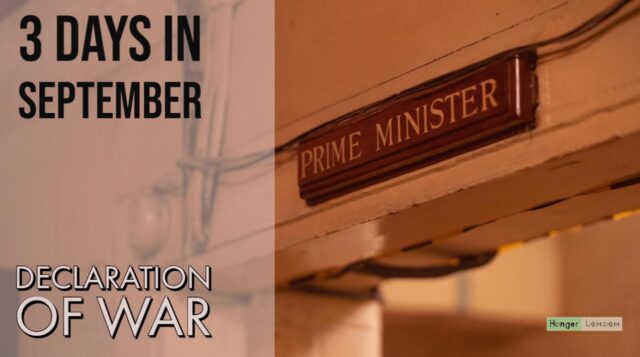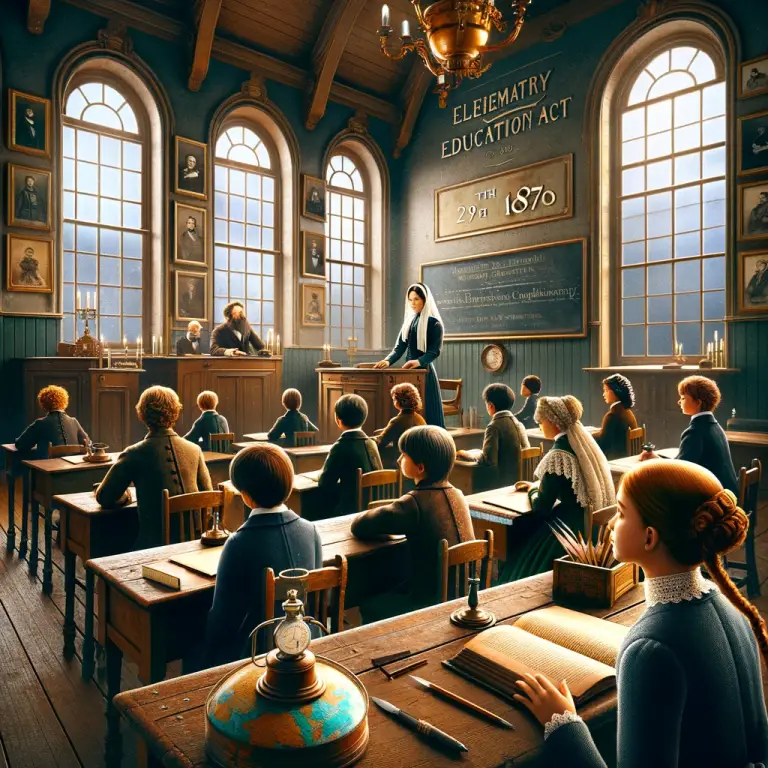In the months leading up to September 1939, tensions between Britain and Germany had been rising steadily. Germany, under the leadership of Adolf Hitler, had been aggressively expanding its territory and military power and had already annexed Austria and parts of Czechoslovakia
On September 1st, 1939, Germany invaded Poland, prompting Britain and France to issue an ultimatum to Germany to withdraw its forces from Poland. When Germany failed to comply with the ultimatum, Britain declared war on Germany on September 3rd, 1939.
The declaration of war on Germany in 1939 was a pivotal moment in history for Great Britain, it seems it was to be the country’s destiny, but it wasn’t as unified a decision as you might think.
The United Kingdom gathered around the wireless sets on the 3rd of September 1939 to hear a 3-minute speech from Prime Minister Neville Chamberlain. At the end of this speech, Britons knew that they were now at war with Germany. Shortly after the broadcast on the BBC, the Air Raid sirens wailed across the country.

The decision to go to war was not an easy one for Britain. Many politicians and members of the public were reluctant to get involved in another conflict so soon after the devastation of World War I. However, the government ultimately decided that Hitler’s aggression could not be allowed to continue unchecked and that Britain had a moral obligation to defend the sovereignty of Poland.
The declaration of the war marked the beginning of a long and difficult period for Britain, as it faced the full force of Germany’s military might. But it also marked a turning point in the war, as Britain’s decision to fight alongside France and other allies helped to galvanise the resistance against Nazi aggression.
The country was at war, 20 years after the Great War to end all wars, as the all-clear wailed out, the phony war would begin. But How did it get to this?
The British Guarantee
Britain had issued guarantees to several European countries. On the morning of September 1st, 1939. The Germans made the first move on the chessboard, and the invasion of Poland began. Tanks crossed the Polish frontier, German Luftwaffe began bombing Warsaw.
At 6 p.m Neville Chamberlain rose in the House of Commons to deliver the British response “the time has come when action rather than a speech required”.
The British Lion was not quite roaring, such was the displeasure with this response from both sides of the house that things were about to get very heated.
Ceasefire proposal, September 2nd, 1939
On the 2nd of September, the cabinet met at 4:30 p.m. to discuss Italian dictator Benito Mussolini’s, proposal of a ceasefire discussion at an international conference. UK cabinet was on the willingness to contend with this proposal unless Germany withdraws its forces from Polish territory.
The cabinet agreed to make an announcement to both Houses of Parliament, to deliver an ultimatum to Germany that would expire at midnight tonight.
The French Delay
The prime minister discussed the matter with the French government of his intentions to deliver his speech, the French wanted to complete its mobilisations before any such announcement would be made, forcing the Prime Minister to make his statement later that day, in fact, he did not make his speech to the house until 7:44 p.m the evening of the 2nd of September 1939.
Why did Britain deliver a Vague response to Germany?
The tone and content of the speech horrified some in Parliament, it differed from the agreements reached earlier that day in the cabinet. The vague language introduced the idea Britain was considering with France issuing an ultimatum, no time frames for that decision, or no coherent, powerful message to Germany. Was it fair to put the blame on Chamberlain for this, there must be some consideration for the French desire to get herself mobilised and combat-ready. It was a reality that France had hundreds of KM of connected borders. It was a message nonetheless, preparation and power. Who had the upper hand?
On day two of the bombing of Poland and the UK government was contemplating further talks or negotiations with Hitler. This was not how I remembered the story of World War 2 from the war films.
“Speak for England and its honor”
Chairman of the backbench foreign affairs committee Wardlaw Milne made a speech in The Commons reminding the Prime Minister of the 38 hours since the Germans had steamrollered into Poland, the country at large was nervous that Great Britain had yet to meet her commitments. The government was on the brink of collapse, both the prime minister and the Chief Whip knew a vote of no confidence would bring the government down.
Cabinet Mutiny
A cabinet mutiny kicked off in dramatic style, as 10 members of the commons depart the chamber for a meeting to press the government to give Germany an ultimatum, and if no such ultimatum was given, the government would fall.
Chamberlain summon the cabinet to a midnight meeting, the fate of Britain would be sealed at this meeting, the weather outside was thunderous, perfect timing for what was proceeding over inside. The decision was made, and at 9 a.m. that morning, the UK government would deliver an ultimatum to Germany with a time limit of 2 hours. The time required before the House of Commons would sit again in the chamber, meeting the demands that had been set.
Radio Address to the Nation ‘I have to tell you now
For the first time in the history of the British government, the House of Commons is in session on a Sunday. Chamberlain makes an announcement from the Cabinet room at 11:15 and follows up a similar statement in the House of Commons shortly after at noon. The government did not fall, but Chamberlain would ultimately pay the price for his reputation badly damaged in the first round of World War Two.
“I have to tell you now that no such undertaking has been received, and that consequently, this country is at war with Germany”
Neville Chamberlain 11:15 am 3rd September 1939 radio address to the nation, declaration of war
Full transcript of Neville Chamberlain’s address to the nation, declaration of war on Germany
“This morning the British Ambassador in Berlin handed the German Government a final Note stating that, unless we heard from them by 11 o’clock that they were
prepared at once to withdraw their troops from Poland, a state of war would exist between us.I have to tell you now that no such undertaking has been received, and that consequently, this country is at war with Germany.
You can imagine what a bitter blow it is to me that all my long struggle to win peace has failed. Yet I cannot believe that there is anything more or anything different that I could have done and that would have been more successful.
Up to the very last it would have been quite possible to have arranged a peaceful and honourable settlement between Germany and Poland, but Hitler would not have it. He had evidently made up his mind to attack Poland whatever happened, and although He now says he put forward reasonable proposals which were rejected by the Poles, that is not a true statement. The proposals were never shown to the Poles, nor to us, and, although they were announced in a German broadcast on Thursday night, Hitler did not wait to hear comments on them, but ordered his troops to cross the Polish frontier. His action shows convincingly that there is no chance of expecting that this man will ever give up his practice of using force to gain his will. He can only be stopped by force.
We and France are today, in fulfilment of our obligations, going to the aid of Poland, who is so bravely resisting this wicked and unprovoked attack on her people. We have a clear conscience. We have done all that any country could do to establish peace. The situation in which no word given by Germany’s ruler could be trusted and no people or country could feel themselves safe has become intolerable. And now that we have resolved to finish it, I know that you will all play your part with calmness and courage.
At such a moment as this the assurances of support that we have received from the Empire are a source of profound encouragement to us.
The Government have made plans under which it will be possible to carry on the work of the nation in the days of stress and strain that may be ahead. But these plans need your help. You may be taking your part in the fighting services or as a volunteer in one of the branches of Civil Defence. If so you will report for duty in accordance with the instructions you have received. You may be engaged in work essential to the prosecution of war for the maintenance of the life of the people – in factories, in transport, in public utility concerns, or in the supply of other necessaries of life. If so, it is of vital importance that you should carry on with your jobs.
Now may God bless you all. May He defend the right. It is the evil things that we shall be fighting against – brute force, bad faith, injustice, oppression and persecution – and against them, I am certain that the right will prevail.”
Context of Chamberlain’s Speech
The context of Chamberlain’s speech was the deteriorating situation in Europe in the lead-up to World War II. In 1938, Chamberlain attempted to appease Adolf Hitler, the leader of Nazi Germany, by agreeing to the Munich Agreement. This agreement allowed Hitler to annex the Sudetenland, a region of Czechoslovakia. Chamberlain believed that this agreement would bring peace to Europe, but it only emboldened Hitler, who went on to invade the rest of Czechoslovakia and, eventually, Poland.
On September 1, 1939, Germany invaded Poland, prompting Britain and France to declare war on Germany. Chamberlain’s address to the nation was a response to this invasion and an attempt to prepare the British people for the difficult times that lay ahead.
Content of Chamberlain’s Speech
Chamberlain’s address to the nation began with the famous words, “I am speaking to you from the Cabinet Room at 10 Downing Street. This morning, the British Ambassador in Berlin handed the German Government a final note stating that, unless we heard from them by 11 o’clock that they were prepared at once to withdraw their troops from Poland, a state of war would exist between us.”
The speech went on to explain the reasons for Britain’s declaration of war and to reassure the British people that the country was prepared for the challenges ahead. Chamberlain acknowledged the sacrifices that would be required of the British people, saying, “I have nothing to offer but blood, toil, tears, and sweat.” He also expressed his confidence in the ultimate victory of the British people, saying, “We shall fight on the beaches, we shall fight on the landing grounds, we shall fight in the fields and in the streets, we shall fight in the hills; we shall never surrender.
Impact of Chamberlain’s Speech
Chamberlain’s address to the nation was an important moment in British history. It marked the beginning of a long and difficult period of war, during which the British people would face many challenges and made many sacrifices. The speech helped to prepare the British people for these challenges and to rally them behind the government’s efforts to defeat Nazi Germany.
However, Chamberlain’s legacy is somewhat mixed. While he is remembered for his role in declaring war on Germany, he is also remembered for his policy of appeasement, which many believe allowed Hitler to become too powerful and ultimately led to the outbreak of World War II. Despite this criticism, Chamberlain’s address to the nation remains an important moment in British history and a testament to the resilience and determination of the British people in the face of adversity.
History doesn’t record the Mess
History records are great for presenting the past as neat progressive outcomes to solutions, the making of Concorde, the Channel Tunnel, the building of the Suez Canal, and the declaration of war on Germany in World War 2. History records the outcomes but doesn’t remember the divisions, the turmoil, the failures, and some cases the pure luck of how things happened. War and politics are complex games.
1939 was a bleak time in Europe, the unabated rise of Germany over the past decade was all to see but many in the seats of power had lived through the Great War and had other ideas that a war with Germany would not be in the country’s interest. We sit here in hindsight of how the war turned out, and the atrocities hidden from the public until the armies of the East and West finally uncovered them.




